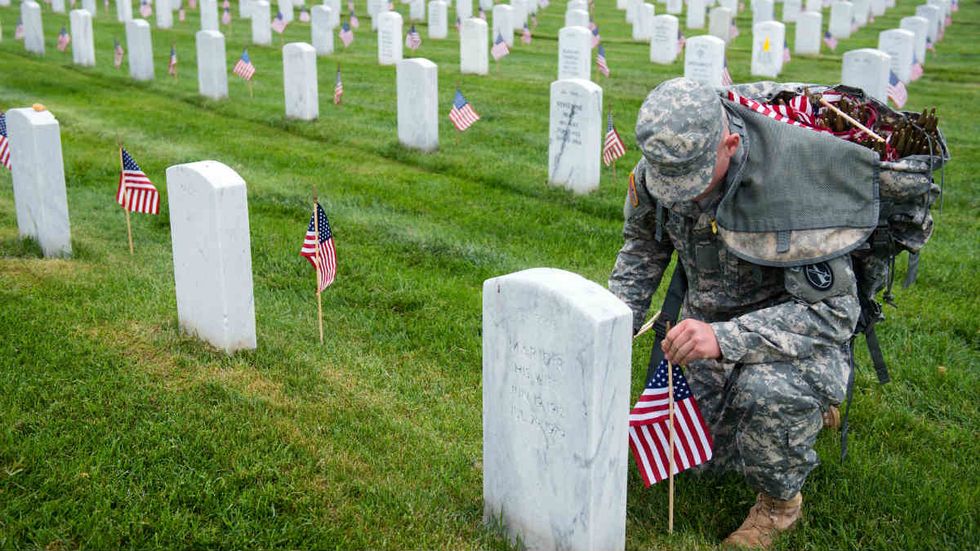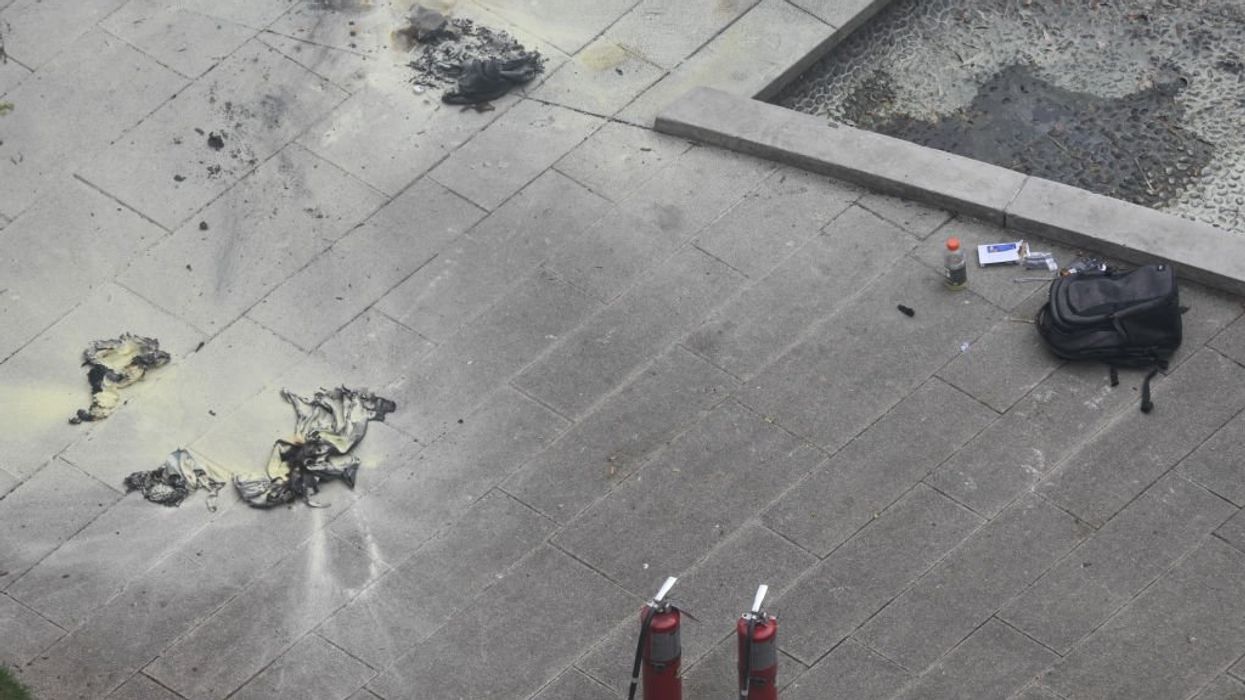
© 2024 Blaze Media LLC. All rights reserved.
What differentiates our soldiers from the way our enemies use their soldiers is that they are not pieces on a board game. Their work is not a game of Risk. They have real lives with families and bright futures ahead of them.
That moral understanding should dictate two overarching principles to policy-makers: 1) Only risk the lives of our troops in war when there is a clear benefit and definitive outcome for the betterment of our security; and 2) Once that decision is made, the war must be executed in a way that prioritizes the survival of our soldiers first, before all other political considerations. This should be a doctrine of all who consider themselves Americans, regardless of political views.
Sadly, since WWII, the value of our soldiers’ lives seems to rate very low on the risk vs. return matrix and cost-benefit analysis of most recent military engagements, if any such analysis was even conducted. For if they ranked high in priority, we clearly would not be pursuing so many of these protracted engagements refereeing Islamic civil wars with often contradictory or unknown goals.
George Patton was famous for saying, “The object of war is not to die for your country but to make the other bastard die for his.” The goal is not to sacrifice our soldiers to promote someone else’s values, but to protect our values first, values that are actually worth sacrificing for. As Reagan said on Memorial Day in 1982 of those who died in WWII, “[E]ach died for a cause he considered more important than his own life. Well, they didn't volunteer to die; they volunteered to defend values for which men have always been willing to die if need be, the values which make up what we call civilization.”
The idea is to fight for our values to ensure that America remains worthy and reflective of those sacrifices. Sometimes it’s inevitable that our soldiers have to make the ultimate sacrifice. But as we remember those fallen heroes this Memorial Day, we must commit to doing everything in our power to advocate for policies that ensure that fewer people make that ultimate sacrifice. And that if they do, they are not falling on the sword of Islam or dying for someone else’s country, but sacrificing for our country to preserve our values.
Sincere people can legitimately disagree over whether various military engagements were in America’s best interests, but it is beyond dispute at this point that before throwing our guys into more meat-grinders with no logical outcome, we need an operational audit of where we are engaged in conflict. We must examine why we are there, identify substantial strategic interests, weigh them against the risk to the lives of our soldiers, and determine what victory looks like. At that point, we need to secure a declaration of war from Congress to get the entire nation on board and better articulate our objectives. Then we must do everything it takes to achieve that mission with no gratuitous risk to our soldiers.
Yet both Republican and Democrat administrations continue to pursue a strategy of “send more troops into the Middle East first, ask questions about the mission, interests, and outcomes later.” We are seeing this again in Syria, Iraq, Afghanistan, and now Yemen and Somalia.
Those of us who never heard the dreaded knock on the door to inform us of a loved one killed in action could never imagine the pain felt by those patriots. But that feeling is undoubtedly aggravated by the thought of one’s husband or son falling on his sword for the Free Somali Army or the Syrian rebels or the Extortion 17 special operators who fell for the corrupt Sharia-based Karzai government in Afghanistan. We no longer have the focused goals or obvious national interests protected by those who died at Omaha Beach.
We paid a heavy price for the Normandy invasion on June 6, 1944, with nearly 2,500 American fatalities. But thanks to meticulous planning, a clearly defined mission, and a no-holds-barred desire to achieve that mission, a continent was freed and the world was saved just one year later. This was all done despite bad luck, dismal weather, and mechanical failures that plagued the assault at Omaha Beach – and all without the enormous technological advantage the U.S. military enjoys today over its contemporary enemies.
To this day, families of WWII veterans can stand on the hallowed ground of Omaha Beach and solemnly reflect with pride on the enormous gains taken and preserved by their parents and grandparents in the fight to protect our national interests and those of all humanity.
What can be said of our modern-day warfare? We have nothing to show for 15 years in Afghanistan but over 1,800 military deaths, 20,000 wounded, and the Taliban controlling more territory than ever before – all to establish a Sharia-compliant government with a constitution (set up by U.S. officials) that fosters the type of Islamic supremacism we are at war with. After 4,400 fatalities and 30,000 wounded in Iraq, the country is controlled by Iranian hegemony, and our troops are now helping Iranian-backed Shiite militias, who are just as brutal as ISIS, take back Mosul from the Sunni Islamists. Then, our air force is bombing those same militias in Syria. Some of these same militias were responsible for killing hundreds of our soldiers when we originally liberated Iraq on their behalf.
At present, this administration is furthering our involvement in the Yemeni civil war. We already lost a Navy SEAL raiding the compound of an Al Qaeda kingpin who is allied with the Hadi government we are supporting, which is fighting the Houthis, who are fighting Al Qaeda!
The only thing worse than not having a coherent, consistent, and defensible policy in the Middle East is placing our soldiers into harm’s way without such a policy in place. How appropriate to reflect upon the words of Oliver Wendell Holmes in his 1884 Memorial Day speech, in which he explained the significance of this day that “celebrates and solemnly reaffirms from year to year a national act of enthusiasm and faith.” This is significant because “to act with enthusiasm and faith is the condition of acting greatly,” and “to fight out a war, you must believe something and want something with all your might.”
What is it indeed that we believe in? What is it we want with all our might? What are we fighting for in the quagmire of endless Islamic sectarian strife?
This is not a rant categorically opposing any engagement in the Middle East. That is a different discussion. Reasonable people can disagree on the prudence of strategy and strategic interests. But if our policy-makers truly valued the lives of our soldiers the way they should, the failures of the past 15 years should weigh heavily on any decision to intervene further in similar quagmires. The questions are: 1) Who is our enemy? 2) What is their threat doctrine? 3) What are our strategic interests? 4) How are they achieved? 5) Are they worth the cost? These questions should be at the forefront of the minds of the civilian and military leadership, not an afterthought to be sacrificed for the priorities of political interests, political correctness, or the whims of the Saudis. Putting America first means putting Americans first — most importantly, our own soldiers.
If this administration is going to continue in the footsteps of its predecessors and throw more troops into these theaters, the president and his advisers have an obligation to articulate to those doing the fighting and to the American public a common-sense description of our goals, desired outcomes, why they are necessary, and how we will end the cycle of refereeing Islamic civil wars, often in a contradictory way in multiple theaters.
Such a small percentage of American citizens have volunteered to serve in the military, particularly on dangerous missions. As we honor and commemorate those who died for our country, let us commit to honoring and valuing our living service members. As President Coolidge said on Memorial Day in 1927:
Reverence for the dead should not be divorced from respect for the living. If we hold those who have gone before in high estimation, it will reflected in our conduct toward those who are still with us. It would be idle to place a wreath on the grave of the dead and leave ungarlanded the brow of the living. Our devotion to the memory of those who have served their country in the past is but a symbol of our devotion to those who are serving their country at present.
Want to leave a tip?
We answer to you. Help keep our content free of advertisers and big tech censorship by leaving a tip today.
Want to join the conversation?
Already a subscriber?
Blaze Podcast Host
Daniel Horowitz is the host of “Conservative Review with Daniel Horowitz” and a senior editor for Blaze News.
RMConservative
Daniel Horowitz
Blaze Podcast Host
Daniel Horowitz is the host of “Conservative Review with Daniel Horowitz” and a senior editor for Blaze News. He writes on the most decisive battleground issues of our times, including the theft of American sovereignty through illegal immigration, theft of American liberty through tyranny, and theft of American law and order through criminal justice “reform.”
@RMConservative →more stories
Sign up for the Blaze newsletter
By signing up, you agree to our Privacy Policy and Terms of Use, and agree to receive content that may sometimes include advertisements. You may opt out at any time.
© 2024 Blaze Media LLC. All rights reserved.
Get the stories that matter most delivered directly to your inbox.
By signing up, you agree to our Privacy Policy and Terms of Use, and agree to receive content that may sometimes include advertisements. You may opt out at any time.



